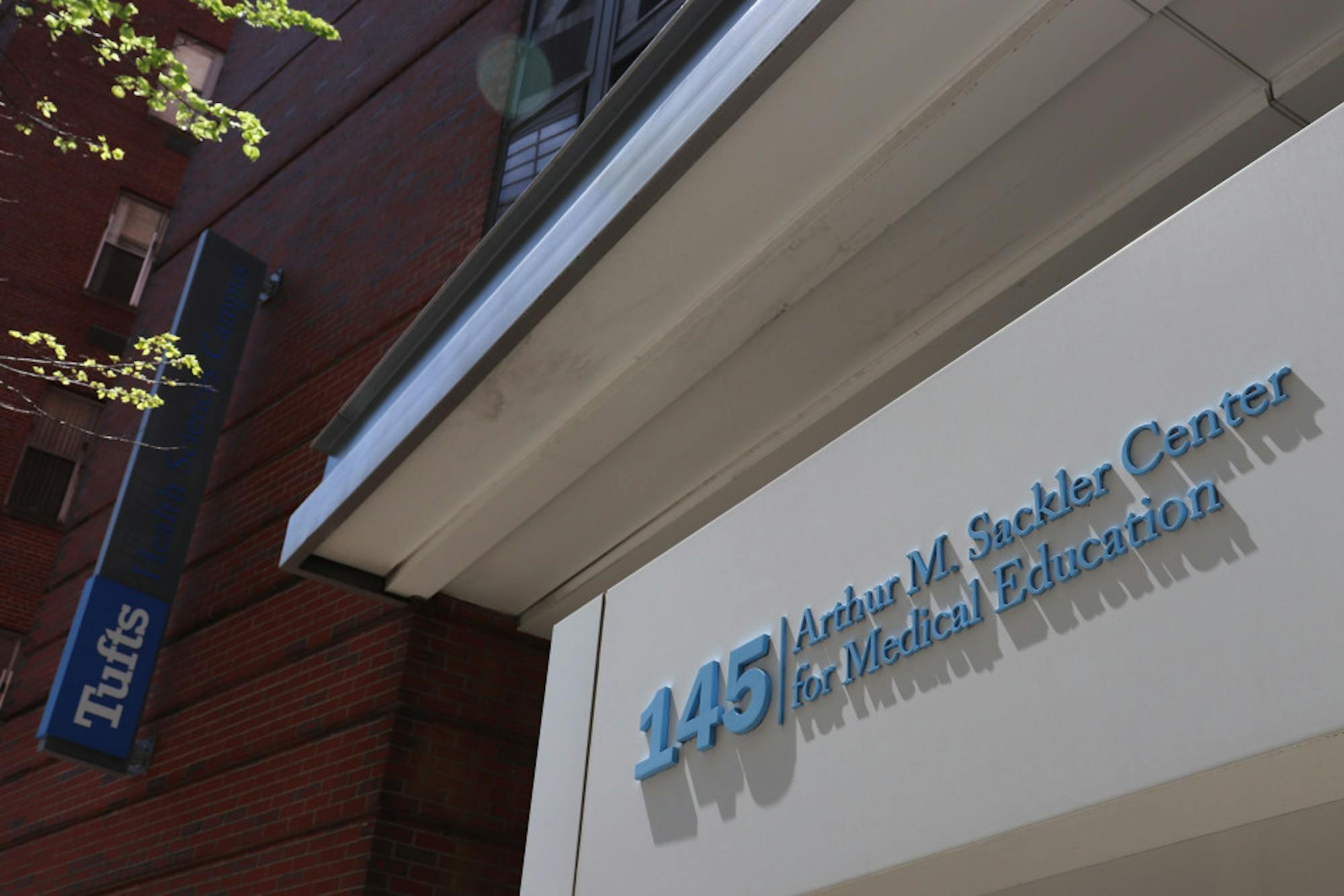Members of the Tufts community responded positively to Tufts’ decision last week to remove the Sackler name from its graduate biomedical sciences school, its medical education building and associated programs, in response to months of discussions by the Board of Trustees which occurred alongside formerU.S. Attorney for Massachusetts Donald K. Stern and Attorney Sanford F. Remz’s investigation on Tufts’ relationship with the Sackler family and Purdue Pharma.
In a Dec. 5 email to the Tufts community, University President Anthony Monaco and Chairman of the Board of Trustees Peter R. Dolan announced these decisions and highlighted the report's findings.
"Our students, faculty, staff, alumni, and others have shared with us the negative impact the Sackler name has on them each day, noting the human toll of the opioid epidemic in which members of the Sackler family and their company, Purdue Pharma, are associated," the email stated.
Paul Hattis, an associate professor of public health and community medicine at Tufts University School of Medicine (TUSM) who wrote a story for CommonWealth Magazine in April condemning the school’s acceptance of funds from Purdue Pharmaceuticals, said Tufts addressed many of his concerns with the report.
Hattis was impressed with the university’s ability to own up to its mistakes.
“The report does not dodge the sad reality that the University, in chasing the ‘almighty dollar’ from Purdue and the Sacklers over the years, made a number of inexcusable mistakes,” he said in an email to the Daily.
Though the report made public that Tufts has received $15 million from the Sackler family and Purdue Pharma since 1980, Hattis would also have liked to learn what amount the university received after the family’s 2007 criminal conviction, a detail not made apparent in the report. He also wonders whether Purdue channeled other funds to the university, or if it accepted money from Purdue- and Sackler-related nonprofit foundations.
Hattis praised the report for highlighting Monaco’s awarding of a 2013 honorary degree to Raymond Sackler, a billionaire who co-owned Purdue Pharma with his brother, Mortimer Sackler.
In 2015, the medical school chose not to assign “Dreamland,”a book on the opioid crisis, as the common read for its students because it was too critical of the Sacklers. Hattis said that this sentiment persists in the report findings.
“[E]ven self censuring of having a more public discussion among the Medical School student and faculty bodies about the opiate crisis was evident from the report findings,” Hattis said.
Mary Bridget Lee, a TUSM student, watched workers remove the name from university buildings. She noted that this was a separate decision not mentioned in the report itself.
“It felt amazing knowing that Tufts was the first medical institution to do that, and to think that maybe Tufts hopefully will set a precedent for other institutions … felt really powerful,” she said.
Lee emphasized the dissonance she experienced seeing the Sackler name displayed at TUSM.
“What our faculty and our deans are teaching us every day is that we take care of patients and respect patients and treat people with dignity, and walking into the office with the Sackler name on your building seems pretty hypocritical,” she added.
Monaco's email echoes this sentiment, saying, "it is clear that the Sackler name, with its link to the current health crisis, runs counter to the [medical] school’s mission" to foster a "sustained positive impact" on public and global health.
Hattis characterized Tufts’ decision to remove the Sackler name from its buildings as a band-aid solution to its structural problems, comparing it to a medical treatment that helps the patient feel better but does not address the root cause of the ailment.
Sack Sackler, a group of students and alumni advocating for Tufts to cut ties with the Sackler family and reckon with its role in the opioid epidemic, also approved of the university’s decision.
“After almost a year of sustained pressure, Tufts University is finally doing the right thing,” Sack Sackler wrote in a Facebook post. "Tufts, to our knowledge, is the first academic institution in the United States to fully cut ties with the Sackler family. That said, we don’t know of any other university so closely tied to the Sacklers’ campaign of deadly medical misinformation. Still, we’ll take it. This is a big deal.”
The university pledged in the report that it would dedicate a $3 million endowment to the prevention of addiction and substance abuse. In its statement, Sack Sackler said it hoped Tufts would seek input from Boston opioid advocacy groups when deciding how to allocate the money.
The Stern report recommended that Tufts overhaul and make public its gift-acceptance policies. Sack Sackler added that the emphasis on changing its decision-making processes reflects these processes’ inherent problems.
“The Sackler scandal shows that secretive, top-down decision making enables the corrupting influence of terrible donors,” Sack Sackler said. “We have consistently demanded, and will continue to demand, democratic community oversight of large donations to Tufts.”
Austin Clementi contributed reporting to this article.
Tufts community reacts to Stern report, removal of Sackler name from buildings

The former Arthur M. Sackler Center for Medical Education is pictured on June 19.





